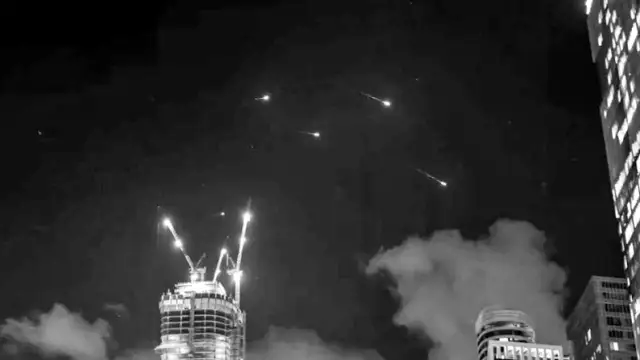On Tuesday night, sirens blared across the occupied territories as Iran launched a massive missile attack known as Operation True Promise II. This retaliation sent shockwaves through the region, with flares and missiles lighting up the sky over Tel Aviv. Explosions echoed in occupied al-Quds, prompting many Israeli settlers to rush for safety in shelters.
The Israel Airports Authority announced that all flights to and from Israeli airports were suspended due to the escalating situation. Reports from the Israeli newspaper Haaretz confirmed “direct hits” in various locations, including Negev and Sharon, as Iran’s missiles struck their targets.
The Islamic Revolution Guards Corps (IRGC) quickly released a statement following the missile barrage. They claimed the attack was in response to the deaths of key figures, including Hamas chief Ismail Haniyah, Hezbollah leader Sayyed Hassan Nasrallah, and IRGC commander Abbas Nilforoushan. The IRGC stated that dozens of ballistic missiles were aimed at critical military and intelligence sites within the occupied territories.
According to the IRGC, this operation was a legitimate act of self-defense, as outlined in the United Nations Charter. They condemned the Israeli regime’s actions, which they described as escalating crimes against the people of Lebanon and Gaza, often supported by the United States.
The IRGC warned that if Israel retaliated, it would face even more severe attacks. In a follow-up statement, they confirmed that three Israeli military bases in Tel Aviv were successfully hit during the operation. The targets included air and radar bases, as well as centers involved in planning attacks against resistance leaders and IRGC commanders.
Despite Israel’s advanced defense systems, the IRGC claimed that 90% of the missiles successfully struck their intended targets. They emphasized that the Zionist regime is now fearful of Iran’s intelligence and operational capabilities.
In a statement to the United Nations, the Iranian mission described the missile attack as a “legal, rational, and legitimate” response to what they termed the terrorist actions of the Israeli regime. They issued a stern warning that any further aggression would lead to an even more powerful response.
In southern Beirut, celebrations erupted following Iran’s retaliatory strike. Gunfire from automatic weapons rang out as people rejoiced in the streets, particularly in areas where Hezbollah chief Nasrallah had been killed in a recent Israeli airstrike. Lebanon’s National News Agency reported heavy gunfire, marking the community’s support for Iran’s actions against Israel.
This latest escalation highlights the ongoing tensions in the region and the potential for further conflict. As both sides brace for possible retaliation, the situation remains volatile. The international community watches closely, aware that any misstep could lead to a broader confrontation.

